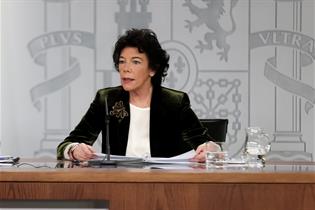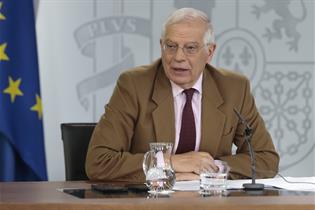Council of Ministers
Government approves extraordinary public employment offer to reduce temporary employment rate
Council of Ministers - 2019.1.25
Moncloa Palace, Madrid
The Council of Ministers approved an extraordinary public employment offer that includes greater stabilisation of the temporary employment rate in the General State Administration (Spanish acronym: AGE) than seen in recent decades. The measure responds to the commitment taken on by the government with the trade unions in July 2018.
The Minister for Education and Vocational Training, and Government Spokesperson, Isabel Celaá, confirmed that the "General State Administration wishes to reduce the temporary employment rate as an improvement in both the efficiency and commitment" of public servants below the target of 8% set for public authorities as a whole. In fact, the AGE places its temporary employment rate at 1.85%.
 Pool Moncloa/JM CuadradoThe Government Spokesperson specified that 2,528 posts will be offered corresponding to 2018, of which 2,041 will be to offer more stable working conditions for those on temporary employment contracts. These positions are in addition to those under other consolidation processes corresponding to 2017 and 2018.
Pool Moncloa/JM CuadradoThe Government Spokesperson specified that 2,528 posts will be offered corresponding to 2018, of which 2,041 will be to offer more stable working conditions for those on temporary employment contracts. These positions are in addition to those under other consolidation processes corresponding to 2017 and 2018.
Isabel Celaá highlighted that 58% of these positions - 1,450 - are designed to reduce the temporary employment rate in research bodies. Specifically, 960 positions will be offered on the Higher Council for Scientific Research (Spanish acronym: CSIC); 261 at the Centre for Energy, Environmental and Technology Research; 93 at the Carlos III Health Institute; 54 at the Spanish Oceanography Institute; 50 at the Geography and Mining Institute and 36 at the Agricultural Research Institute.
The minister claimed that "Spain needs researchers committed to the social and scientific fabric and, to that end, they need stability".
Aid for areas affected by disasters in 2018
The government approved a Royal Decree-Law to increase financial aid and tax breaks to alleviate the damage caused by storms, fires, flooding and other natural disasters that affected different areas of the country last year. It also makes the procedures for applying for aid more flexible and implements labour and social security measures for those regions affected.
Isabel Celaá underlined that this aid is in addition to that previously agreed by the Council of Ministers.
EU emissions allowances
The government approved a Royal Decree to prepare for the entry into force in Spain of the new phase of the European Union Emissions Trading System (EU ETS), applicable between 2021 and 2030. The ETS is one of the EU's main tools to comply with the Paris Agreement on climate change and to reduce emissions in a cost-effective way.
Extradition of Spanish citizen Carlos García Juliá
The Council of Ministers has agreed to apply to the Brazilian authorities for the extradition of Carlos García Juliá to serve out his sentence for the crimes of murder and illegal possession of weapons. On the night of 24 January 1977, Carlos García Juliá took part, together with three other people, in the murder of five labour lawyers who had an office in calle Atocha in Madrid as well as injuring another four.
On this matter, the Government Spokesperson declared that, "This story must be not forgotten, so as not to go through it again. And those labour lawyers represent the share of pain that this society paid for its transition to democracy".
Government advocates calling snap elections in Venezuela
 Pool Moncloa/JM CuadradoDuring her speech at the press briefing following the Council of Ministers, Isabel Celaá referred to the situation in Venezuela following the self-proclamation as Interim President of the Republic of Venezuela by the Speaker of the National Assembly, Juan Guaidó.
Pool Moncloa/JM CuadradoDuring her speech at the press briefing following the Council of Ministers, Isabel Celaá referred to the situation in Venezuela following the self-proclamation as Interim President of the Republic of Venezuela by the Speaker of the National Assembly, Juan Guaidó.
Isabel Celaá declared that the government reiterates the legitimacy of the Venezuelan National Assembly and insisted that the solution to the conflict lies in immediately calling free elections that allow the Venezuelan people to express themselves. "We strongly reject the use of violence and force and regret the deaths that have taken place. There must be no more killing. To that end, our position seeks, in agreement with our European partners, to find a solution for Venezuela that is solely and exclusively democratic", she said.
Along the same lines, the Minister for Foreign Affairs, the European Union and Cooperation, Josep Borrell, insisted that "free, fair, credible elections must be called in Venezuela in line with democratic standards", a position that the government has conveyed to the Venezuelan Government by all channels available".
Josep Borrell recalled that the government has exercised "a task in leadership and commitment so that the crisis in Venezuela is taken into consideration by the European Union", and backed the idea of setting up a contact group between the parties. In this regard, in the same way as Isabel Celaá, he referred to the interviews held at the Davos Summit by the President of the Government with the presidents of several Latin American countries and with representatives of the main European countries.
The minister added that if we see that the Venezuelan regime has no intention of calling elections, Spain would propose to recognise Juan Guaidó as Interim President so that the Venezuelan National Assembly can then call snap elections. He also called for a consensus from partners in the European Union on this matter.
Weekly assessment
Isabel Celaá recalled the participation of Pedro Sánchez in the Davos Forum. After nine years without a President of the Spanish Government attending the forum, she said, Pedro Sánchez focused his message on "placing the economy at the service of people, on fighting inequality and on advocating an ecological and inclusive economic model as the antidote to nationalist populism".
The Government Spokesperson added that the President of the Government held meetings with leading officers of the large technology companies, and underlined the confidence of foreign investors in Spain.
At a parliamentary level, the minister highlighted that the Lower House of Parliament has ratified seven decree-laws with majority support from all the political forces. Of the 25 decree-laws presented by the government to the House, 24 have been ratified.
On another note, Isabel Celaá reiterated the government's support for the family of Julen, the toddler who fell down an old well shaft in Totalán (Malaga), and thanked the neighbours of the village and the rescue teams for their support and solidarity.
Non official translation





